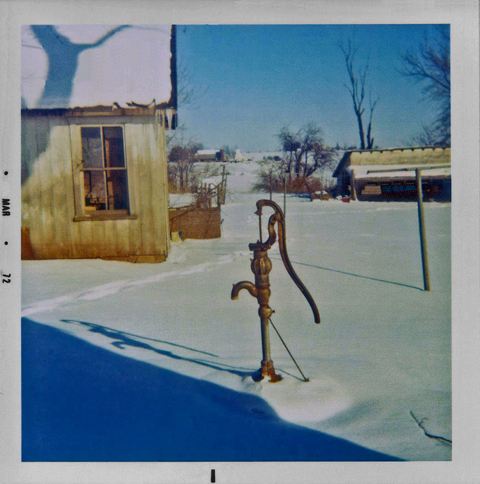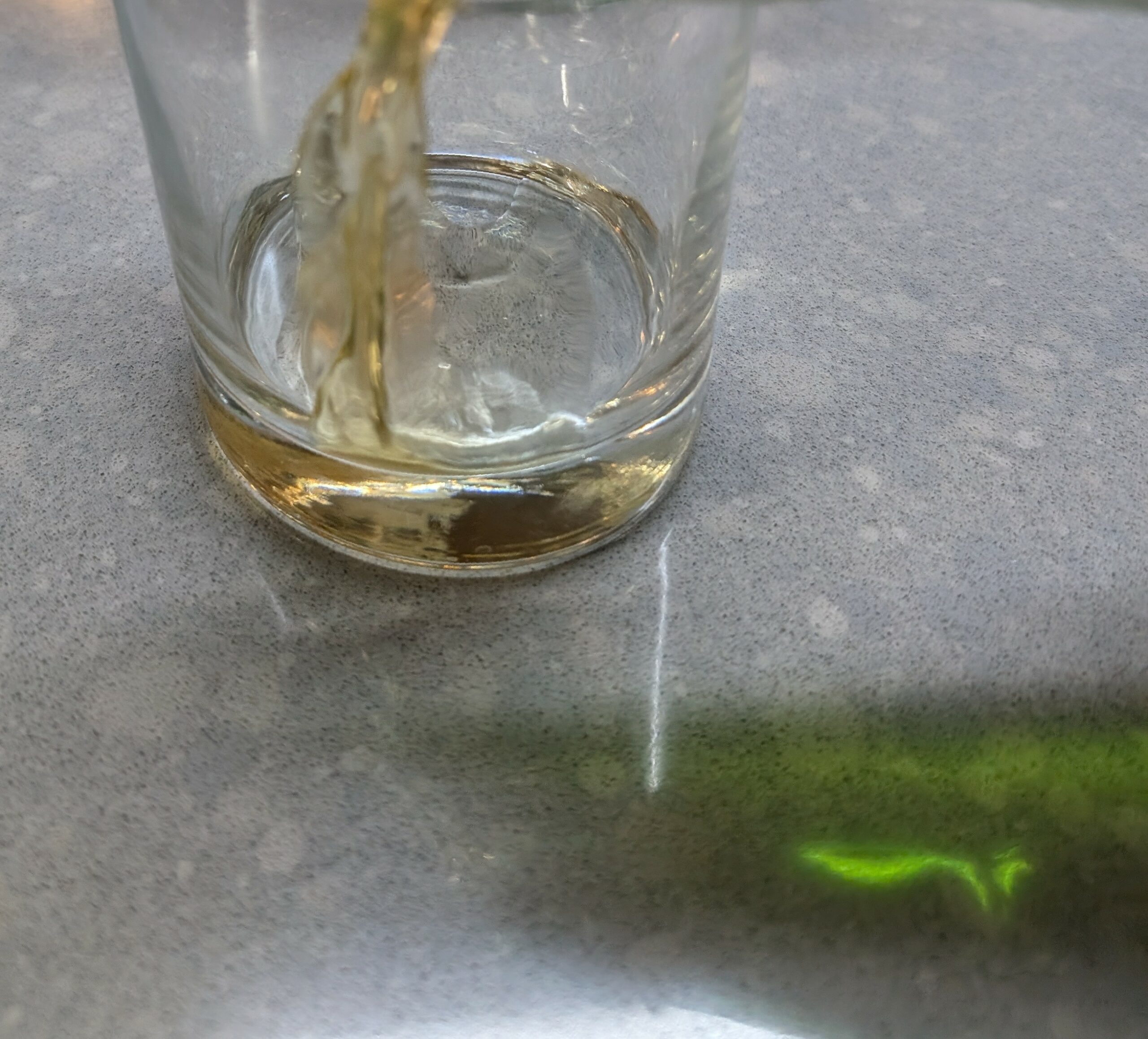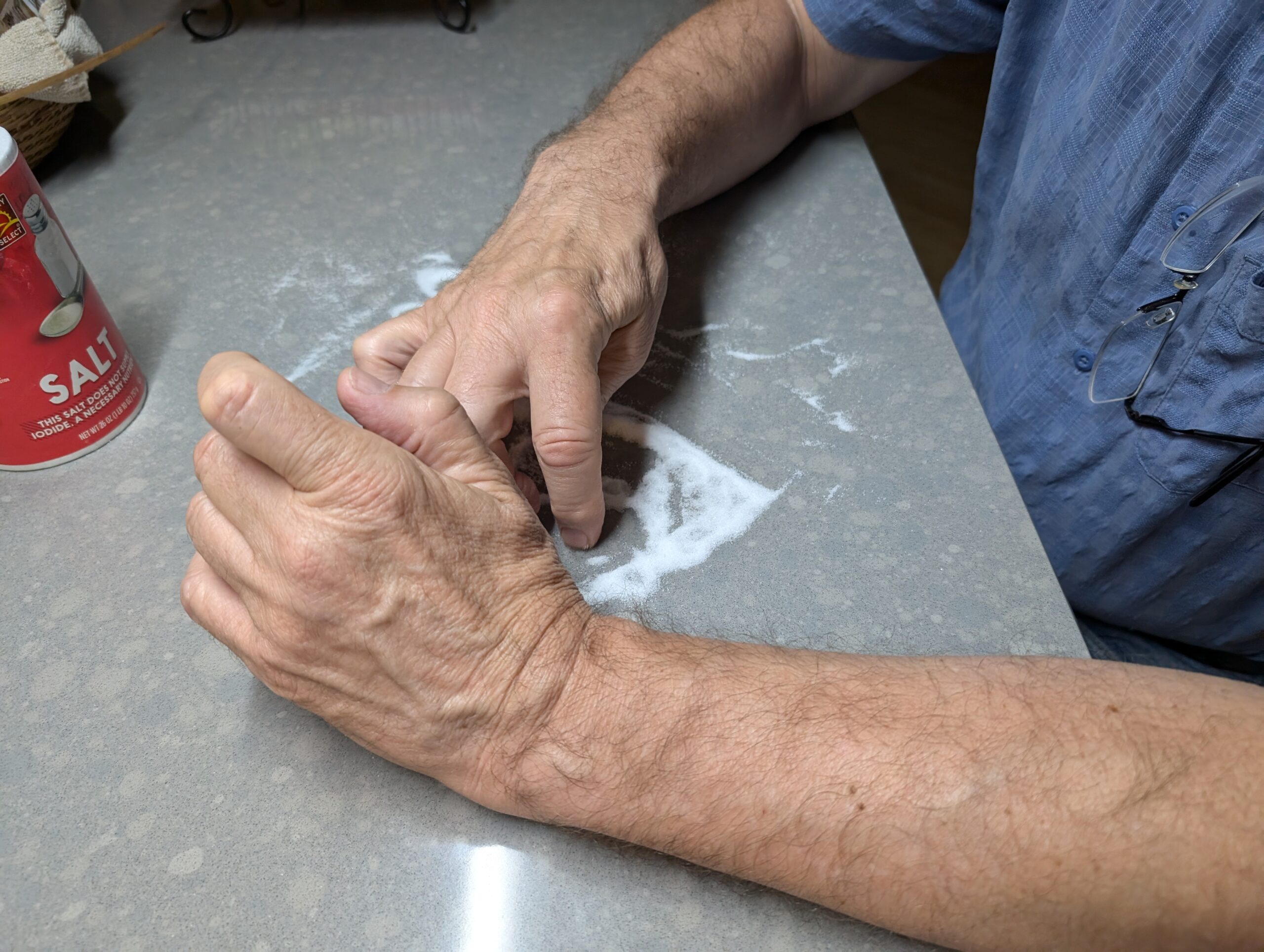Since her surgery a week ago, Colleen’s days have settled into an unusual silence. The doctors recommended a tracheotomy to prevent the cancer cells from squeezing her airways and suffocating her. I look at our friend, this woman who delighted in expressing her opinions on all things political, theological, theoretical. Post-surgery, she can only write her thoughts laboriously on a whiteboard and hope we will be able to decipher the chicken tracks that appear. Colleen was never at a loss for words, but of words spoken rather than written. Now, when she wants to communicate she must write her thoughts from under the layers of Dilaudid and Ativan that keep her calm and sleepy. There is the further complication of double vision that comes from the edema which has blistered her eyes. Finally, add the difficulty of writing from a supine position, looking down her nose toward the whiteboard, and you have a perfect storm that slows or halts effective communication.
It is painful to watch Colleen struggle to communicate. We’ve tried numerous writing options, including a computer set-up that clipped on the bed rail. When we discussed that possibility, she scribbled “Stephen Hawking” and smiled, her sense of humor intact. In the end, the whiteboard remained the best option.
Despite our best efforts with this loving bed bath and winter morning lotion, the sour body smell never completely dissipates, as if in a mere week, the cancer and the odor have laid claim to her body, a tangible reminder of our fleeting and frail nature. No matter how much we have prepared for her death in the past several years, the end of life (especially for someone not yet 60) creeps in with numbing finality. We take turns walking out into the bitter Indianapolis cold and snow of January, desperately attempting to clear our clogged minds and freeze our grief.
When we were young and in our prime, before careers and marriage and life led us in different directions, Colleen, Marnetta, and I lived together in Iowa City. Our time together began in the tumultuous years after Marnetta and Colleen returned to the United States following a stint in Northeast Brazil with Mennonite Central Committee. Reacclimating to a consumer-driven society after several years in drought-stricken Northeastern Brazil was difficult enough. Colleen’s return was complicated by the residual trauma caused by the misogyny of her male supervisor. He was exceptionally antagonistic toward Colleen with her feminist understandings, her perspicacity, and her open rejection of his incompetence and bullying.
They returned in the first years of the Reagan administration. Our fortieth president, calling for a “New Federalism,” cut taxes, slashed federal spending for social programs, and increased the military budget. Nuclear annihilation felt imminent. Homelessness was on the rise. Reagan stirred national antipathy and anger toward the poor and minorities by calling out a (nonexistent) “Welfare Queen.”
Any homecoming includes a bout of culture shock. This political climate complicated their return. They struggled with job hunting. In the evenings we sat around our kitchen table, discussing painful personal and political issues. In a sense, we ran our own halfway house in our duplex. We found communion in a local peace community and in a church with likeminded people. We stood together in zero-degree weather at prayer vigils for peace in Central America, bundled up against the frigid Iowa winter. We protested our government’s policies in support of the Contras and marched a half a million strong in a SANE demonstration in Chicago. We worked at the food kitchen and kept company with Central American refugees seeking sanctuary with a local United Church of Christ congregation.
As Colleen and Marnetta worked their way through culture shock, our friendship grew. We lived together several years before parting ways: Marnetta to El Salvador as a nurse, Colleen to seminary in the Midwest, and I to Oakland to work in a homeless shelter. We never lived in the same community again, but we stayed in touch. A few years later, I married Colleen’s brother.
Thirty-five years later, we are at Colleen’s bedside in her final weeks of life. Following her bath this morning, Colleen dozes. When she opens her eyes again, she motions us to come close. She writes, “I’m disoriented.” We remind her that she is in the hospice room. She points to her throat, a request to be suctioned. With her throat suctioned, Colleen relaxes and points to the two of us at opposite sides of her bed. She writes an addendum to her first thought, “But you two orient me.”
Colleen always believed that the worst possible thing would happen. When I lived with her, mild winds were certain to become tornadoes. Someone not returning home on time was lying in a hospital bed. But now, when the worst really has happened and her breast cancer has metastasized after remission, Colleen has become uncharacteristically Zen-like.
Years of fighting political and theological systems, decades of advocating for those with less power, have not translated into fighting for her own life. She has steadfastly refused chemotherapy, looking instead for ways to enjoy her time. A fine-art photographer, she bought a smaller camera when a deteriorating spinal cord no longer allowed her to carry heavy equipment. She made her bucket list and checked things off methodically. She communicated with friends (along with a nemesis or two) to “make things right.” She doubled down in her efforts to show children (in the elementary school where she was a social worker) how to resist bullying, how to respect others, how to love themselves.
Colleen worried about others’ experience of her death more than her own. She prepared her schoolchildren for when she would not be with them anymore. She inquired about our support for her refusal of treatment. She feared that her death might cause me extra pain, coming so close to the death of my older brother. But for herself, she seemed to have no fear except of suffocation if no one was available to suction her airways. “There are always,” she writes on her whiteboard, “more lessons to be learned. But I am at peace.”
Six months before her death, we spent a week together on an Alaska UnCruise, the final line on her bucket list. With typical thoroughness, Colleen researched the possibilities for a trip that would accommodate her needs and provide as much beauty as her much desired but now impossible trip to New Zealand. The UnCruise was a success. Her doctor gave her enough steroids to sustain her and she joined us in most days’ events.
In the evenings, we sat together, three friends in a hot tub at the stern. There was much to discuss about the thirty-plus years of our friendship: fears of life in Trump’s America, the suicide of Colleen’s 17-year old daughter, Marnetta’s husband’s Asperger’s Syndrome, my son’s prison time. All three of us have adult children in various stages of finding their paths in life. Each of us endures some workplace trauma.
Mostly, however, we sat in silence, warmed by the water and by our friendship, surrounded by the beauty of the Northwest Passage, enjoying the solstice sunsets.
Growing up in a family of evangelical missionaries, Colleen rejected much of what she learned as a child about a personal relationship with Jesus. She maintained a love for the life of Jesus and replaced it with a faith of political engagement and concern for justice. She began her life’s work in sustainable agriculture and ended it working with immigrant children and gang families searching for safety in a world not concerned for their well-being. In between, she worked on water issues in a Base Christian Community in Northeast Brazil, and with victims of domestic violence in post-war Nicaragua. She helped her church hammer out a clear policy for what to do when domestic violence occurred within the congregation. And her faith became more ethereal, at peace with mystery.
Now, in varying states of consciousness and cognizance, she frequently writes the words light and happiness on her whiteboard. Her thoughts aren’t always clear to us, but she doesn’t seem to mind. She writes, “I am closest to death when I am happiest.” And later in the day: “Light can help you understand how to put it all together.” When we start to speculate on the meaning of her words, she holds up one finger and shakes her head, indicating that we should stop. Sometimes, it is best to rest in the mystery.
One of the evenings, I sit alone with Colleen. Our silence is mirrored by the light snowfall outside the window. During the day she had been anxious, but in the evening glow, she is again resting quietly. I sit by her bed in companionable silence.
Feeling around her covers for the pen, she writes, “Look on the porch.” Not sure what to look for, I list what I see in the fading light. I describe the snow on some rocks, the placement of two deck chairs, and the leaves that lift curled corners out of the snow. She holds up her finger to stop, then writes, “I think Tony might have left a feather.”
I am confused. I know her friend Tony, the Native American shaman with whom she had a deep spiritual connection. But he had moved to Houston a few years back. While I tried to figure out what she means, she writes, “I feel better,” pointing to what she had written about Tony and the feather. I understand: a feather from Tony would indicate a token of his prayer for her. Without waiting for confirmation, she falls asleep, no longer worried about breathing. She sleeps peacefully.
Colleen loved good food and good coffee. Despite her frugality, she made an exception for what she ate. At the last Thanksgiving meal, when she could hardly stand for more than five minutes, she helped prepare the turkey, placing herbs and garlic under the skin, stuffing it with a special sausage and mushroom stuffing. Marnetta, Doug, and I made the rest of the meal, but each step was done at her direction. She had chosen the wine with care. She opted for roasted Brussels sprouts and a grated carrot salad using a much-loved family recipe. She supervised the bread-baking with a special recipe she had just discovered. We ate and drank together, our last supper, our final breaking of bread.
Now, several months later, she is getting tube feedings. Nutrients without flavor, calories without joy. Doug stands by her bed, holding a cup of espresso when she writes “taste” and points. He picks up the small sponge on a stick, the one we use to keep her mouth moist. He dips it into the coffee and holds it out to her. She accepts it with a look of delight. After lunch, Doug holds a cup of corn candy in his hand and she writes, “what is it?” He hands her a piece, which she licks, then writes, “Death by corn candy.”
Her writing becomes more obtuse, at times a bit philosophical. At one point she points to her mouth to request that we swab her lips and her tongue with water. We do it carefully so that she won’t gag. After she is hydrated, she pulls the whiteboard to her and writes, “Never take a drop of H2O lightly.”
Throughout her life, Colleen had a fondness for ritual: fondue every New Year’s, cinnamon rolls on Sunday morning, massages on birthdays, chocolate for all celebrations. A week after the tracheotomy, following her decision for palliative care only, she requested one final ritual: to be anointed with oil. She wanted this to be a final confirmation from all of us that we would set her free, at peace with her decision to refuse treatment. We gathered around her bed while Barry, her spiritual guide, led us through a meditation. He ended with a line from a Mary Oliver poem, “I Did Think, Let’s Go About This Slowly.” The poem ends, “But bless us, we didn’t.” We chuckled at the truth of the line in Colleen’s life.
If not slowly, Colleen certainly went deliberately, with lots of preparation and precision. She reflected on leaving a world in which Trump was president, the one thing that made her happy. Her lifetime of activism no longer possible, she used her Facebook page to post articles and analysis, to beg people to pay attention to the erosion of civil and human rights, to call out our compassion and empathy. She was particularly concerned about DACA and about supporting Black Lives Matter, movements and issues that affected the daily lives of her students.
As her cancer spread, Colleen began to plan her memorial service. After surgery, it appeared she could live a long time. Her vitals remained on target. We were making plans to move her home. The tracheotomy helped her breathe better. But there were gradual changes that week, until she finally wrote to Marnetta, “This is no quality of life.”
With that admission, Colleen reached a turning point. She refused to pick up the whiteboard. She still smiled and held our hands. When someone did something for her, she pressed her hands together in a namaste pose, grateful but no longer communicating. After she quit writing, her vitals remained strong for several days. Then her oxygen levels began to drop; within twenty-four hours her heart stopped.
Against all indications of a strong respiratory system, Colleen willed herself into death.
Six months after Colleen’s death, Marnetta and I sit on a cliff high above the Pacific Ocean at Torrey Pines State Preserve north of San Diego. We traveled here to release some of Colleen’s ashes in a place where she had once spread the ashes of her daughter, Teresa. She had told us to find a place of great beauty. In our travels together she insisted on sticking her toes into any nearby body of water. Whether it was the Adriatic Sea or Alaska’s Inner Passage or the lakes of Plitvice in Croatia, this was one of her rituals. Marnetta and I decided that Torrey Pines fulfilled all requirements. We would carry Colleen’s ashes to a “place of great beauty” and give her one last ritual of “touching the water.”
The sky is cloudless and clear. The blue of the sky reaches out to the blue of the ocean. The color, the clarity, and the solemnity converge at the base of my throat. Sitting on the cliff, looking out to the horizon, I pull out the bag of ashes. As I hold them in my hand, I tell Marnetta we should have planned a ceremony for this moment, in deference to Colleen’s love of ritual. But then I tell myself that ritual wasn’t my thing, nor did I think of it as Marnetta’s thing. Marnetta replies that she, too, had contemplated more planning, but decided she’d leave it to me.
“However,” she continues with a bit of a chuckle, “I did think that it just might be like Colleen to show up today and let us know that she is here.” I relinquish belief in annihilation, giving in to the spirit of the moment, and agree that such a connection would be wonderful. “Perhaps,” I tell Marnetta, “the rattle we hear in the rare pine trees is Colleen telling us how happy she is with our choice of location.”
We recount some aspects of Colleen’s life, starting with her fierce commitment to social justice. We remember her campaign to boycott Coca-Cola in the 1980s when the company ran militaristic ads on television. We note how her male supervisors often chafed at her outspoken bluntness. We admire her steely determination to be a voice for the powerless. We also remember how the physical loss of her voice connected to the loss of her will to live.
Many of the children she had counseled over the years attended her memorial service. One young woman stood up to say that because of Colleen, she left behind life in an Indianapolis gang and was now in college. A few children wrote notes to the family. One called Colleen a superhero. Another wrote, “I took her love givin (sic) to me and put it in a pretty place in my heart.” Another one said how much he would miss her, “… but there is still a fire burning of friend love that will never turn off.”
Following the memorial service, we set up tables in the church fellowship hall. One table symbolized her love of beauty and art. Another table held small bites of cheese and bread and tumblers of wine and grape juice, representing her pleasure in taste and smell. The last table held a DACA petition with postcards to send to members of Congress, a memorial to her passion for social justice.
Sitting on that cliff in the warm June sun, Marnetta and I remember these things about our friend and sister. We are together in this beautiful place and Colleen’s work has ended. We have grieved our loss often in the last six months, but today we celebrate her passion and the joy of friendship. Colleen’s remains lie between us, gray ashes atop tan dirt.
We rise to continue our hike along the ocean. Then hunger hits us and we step up the pace in anticipation of another shared meal before returning home once again.




